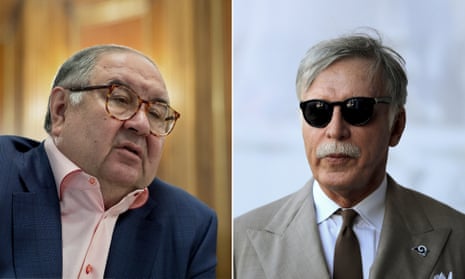Len Shackleton, a footballing maverick who was earning the maximum wage of £17 per week by the end of his luminous career in 1957, chose a particularly striking way to outline his disdain for the men who ran football clubs. In his autobiography he dedicated a chapter to the occupiers of the boardroom titled “The Average Director’s Knowledge of Football” – it consisted of a single blank page.
Having fallen out with various directors, Shackleton curtly referred to them as “those people upstairs”. It just goes to show that a disconnect between the proletariat and the businessmen who get to make decisions about club affairs is a thread that goes way back in the history of the game.
Ian Wright evoked that Shackleton spirit this week when he reacted to the icy power-struggle involving Arsenal’s two most powerful billionaire shareholders. He punched out some impassioned tweets in response to the stock-market duelling as Stan Kroenke and Alisher Usmanov vie for each other’s stake. Reading between the lines, you can imagine Wright thinking to himself: “What on earth do these two men really know or care about football?”
As Arsenal’s Old Etonian former chairman Peter Hill-Wood famously said when Kroenke first appeared on the scene: “We don’t want his sort.” The natural suspicion of an overseas investor’s motives was crystal clear. The old Arsenal board was made up of families who had been associated with the club for decades but they had to do some soul-searching 10 years ago when two super-rich interested parties turned up – one from the US and one from Russia – to acquire an interest in the wealth swilling around Premier League football with its ever-growing television deals and commercial potential. Did it matter what either of them knew or cared about Arsenal? Was one sort preferable to the other?
In the brave new world of oligarch- and entrepreneur-driven football clubs, they took the plunge with Kroenke, whose stewardship style is to take a back seat and let the business coast. His hands‑off approach was one of the factors that appealed. But as Arsenal’s Kroenke era drifts on, the kind of comfortable and complacent atmosphere to rile the likes of Wright brings us back to that question of whether it matters how much the American knows or cares about football.
The history of the game has thrown up some exceptional custodians, revered for looking after a club as if it were a family treasure and giving every ounce of business acumen and in some cases philanthropic wealth to protect and promote it, always with the club at heart. Jack Walker at Blackburn, the Cobbold family at Ipswich, Matthew Harding at Chelsea, Dick Knight at Brighton & Hove Albion all spring to mind.
In James Montague’s book The Billionaire’s Club, which examines the new wave of investor-owners from Eastern Europe, the US, Asia and the Middle East, he asks a critical question. “Does it matter who owns a football club? Does it matter why someone has chosen to buy and bankroll your team? The simplest answer I heard, whether it was Colin at Portsmouth or Jacco from ADO Den Haag, was that most fans I meet didn’t care; as long as their team won silverware, they would accept almost any owner. But not everyone wins, and that is when the questions begin to be asked. About the owners and what they are in it for.”
What are they in it for? The bluntest answer takes the form of balance sheets. In terms of the cold war at Arsenal, it is instructive to take a look at what has happened to the share price since Kroenke and Usmanov began investing in the club. The cost of a share in the summer of 2007, when both men started to build their stakes more seriously, escalated quite quickly from £7,500 to £10,000. In 2011 Kroenke made his big move to become majority shareholder with the share price valued at just over £11,000.
Now, after the two have sat on their stakes for a decade and not invested one penny in the club during that time, Arsenal are in a position where Kroenke felt able to turn down £32,000 per share from an external consortium before testing the water to buy out Usmanov. Without having to do much at all the investment has more than tripled in value. Perhaps he and Usmanov see it as too much of a good thing to sell, with even greater appreciation anticipated. That seems to be the state of play as each rebuffs the other’s inquiries about selling.
It leaves Arsenal at a stifling impasse, with two men who cannot seem to cooperate in an uneasy non-alliance. Frustrated supporters do not have the easiest task to air their discontent about the ownership in a way that gets to the men themselves. Kroenke seldom attends games. In days gone by owners would have to run the gauntlet of vocal abuse on their way back to the car park after a match.
In the average old days of the mid-1980s Arsenal fans gathered in their thousands outside the marble halls, just below the windows of the oak-panelled boardroom, shouting “sack the board” and the rest. It was seen and heard all right. But the disaffected of today have few obvious ways to vent their disappointment directly to the ruling factions. Social media protestations or occasional chants at the stadium, such as at the final home match of last season against Everton and a bad-tempered AGM when Kroenke comes to town, have not yet had any major impact.
Ordinary fans will not have it easy trying to take it to the billionaires, who might not know considerably more than Shackleton’s friends upstairs, but have the money, and the distance, to ignore it.

Comments (…)
Sign in or create your Guardian account to join the discussion